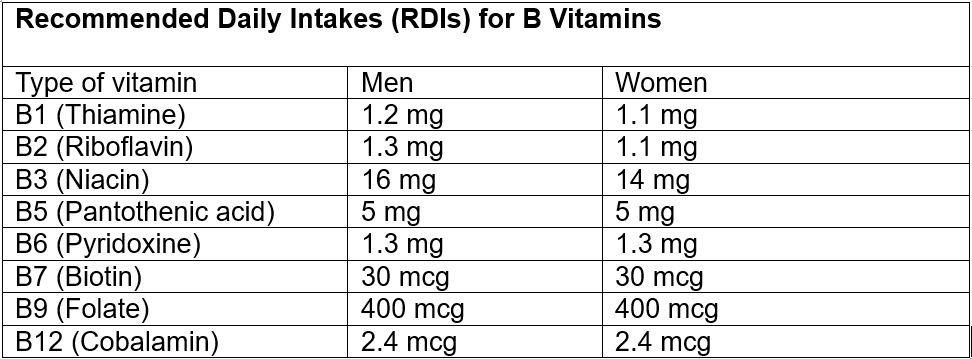Benefits of B-Complex Vitamin
Vitamin B-complex is a collection of water-soluble vitamins essential for the body. They play important roles in certain bodily functions, such as helping your body make energy from the food you eat, and forming red blood cells.
They include the following vitamin types; B1 (thiamine), B2 (riboflavin), B3 (niacin), B5 (pantothenic acid), B6 (pyridoxine), B7 (biotin), B9 (folate), and B12 (cobalamin). These vitamins are naturally present in a range of food sources such as meat, leafy greens, dairy, beans, peas, and whole or fortified grains.
What Are the Health Benefits Of B-Complex Vitamin?
• May reduce stress – Vitamin B supplementation can benefit mood. Research shows that certain B vitamins may help to alleviate stress.
• Improved eyesight – A deficiency in B-complex vitamins was linked to defective vision. A deficiency of vitamin B12 may also lead to optic neuropathy, which may result in blurring, blind spots, diminished color vision, pain when moving your eyes, or total blindness.
• Healthy brain function – B vitamins have been found to impact the central nervous system. Vitamins B6, B12, and folate have been linked to better cognitive health in the elderly. Individuals dealing with dementia were also found to have lower serum levels of B vitamins (especially folate and vitamin B12).
• Nerve function – Vitamin B12 has been linked to nerve regeneration. Vitamin B12 also scavenges the reactive oxygen species. It has an anti-apoptotic and anti-necrotic (preventing the early death of cells) effect on the brain’s neurons.
• Cardiovascular health – B vitamins help replenish various energy stores in the body. A deficiency in these vitamins can lead to reduced energy stores, which have been linked to myocardial dysfunction in patients with heart failure.
• Boosts testosterone – B vitamins are sometimes included in “testosterone-boosting” supplements and are thought to increase testosterone levels in men, which naturally decrease with age.
• Prevents infection – Folate may also boost immunity, although we need more research at the moment. Folate plays an important role in DNA synthesis, in the process of production and repair of DNA, and may have an impact on the immune system.
• Pregnancy – B vitamins are especially important for those who are pregnant or breastfeeding. These vitamins aid in fetal brain development, and they reduce the risk of birth defects.
How much B complex do I need?
The following recommended daily intakes (RDI) for each of the eight B vitamins:

What Are Some Common Symptoms of B Vitamin Deficiency?
• Anemia – Folate deficiency can cause megaloblastic anemia, characterized by the production of unusually large, abnormal, and immature red blood cells.
• Skin conditions – Certain skin disorders like rashes, dry and cracked skin, and acne can also be a sign of a B vitamin deficiency.
• Peripheral neuropathy – It is a nervous system condition that is often felt as a stabbing (sharp) or burning pain. Damage to peripheral nerves may impair sensation, movement, and gland or organ function depending on which nerves are affected resulting in different symptoms.
• Digestive disorders – Cobalamin deficiency may cause megaloblastic anemia, fatigue, weakness, constipation, loss of appetite, weight loss, and neurological changes such as numbness and tingling in the hands and feet.
Are There Complications from Too Much B Vitamin?
You are unlikely to get too much vitamin B complex from your diet. When consumed in excess, a few different B vitamins can have specific side effects. For instance:
• Vitamin B6. Too much B6 may lead to peripheral neuropathy, which is a loss of feeling in the arms and legs.
• Folate or folic acid. Too much of this vitamin can cover up the symptoms of a vitamin B12 deficiency, which can eventually lead to nervous system damage.
• Niacin. Too much niacin may cause skin flushes. Long-term excessive use may lead to liver damage.
References:
https://www.verywellfit.com/b-complex-vitamins-89411https://www.healthline.com/health/food-nutrition/vitamin-b-complex#supplements
https://www.intechopen.com/chapters/78374
https://longevity.technology/lifestyle/vitamin-b-complex-benefits-function-risks-and-sources/